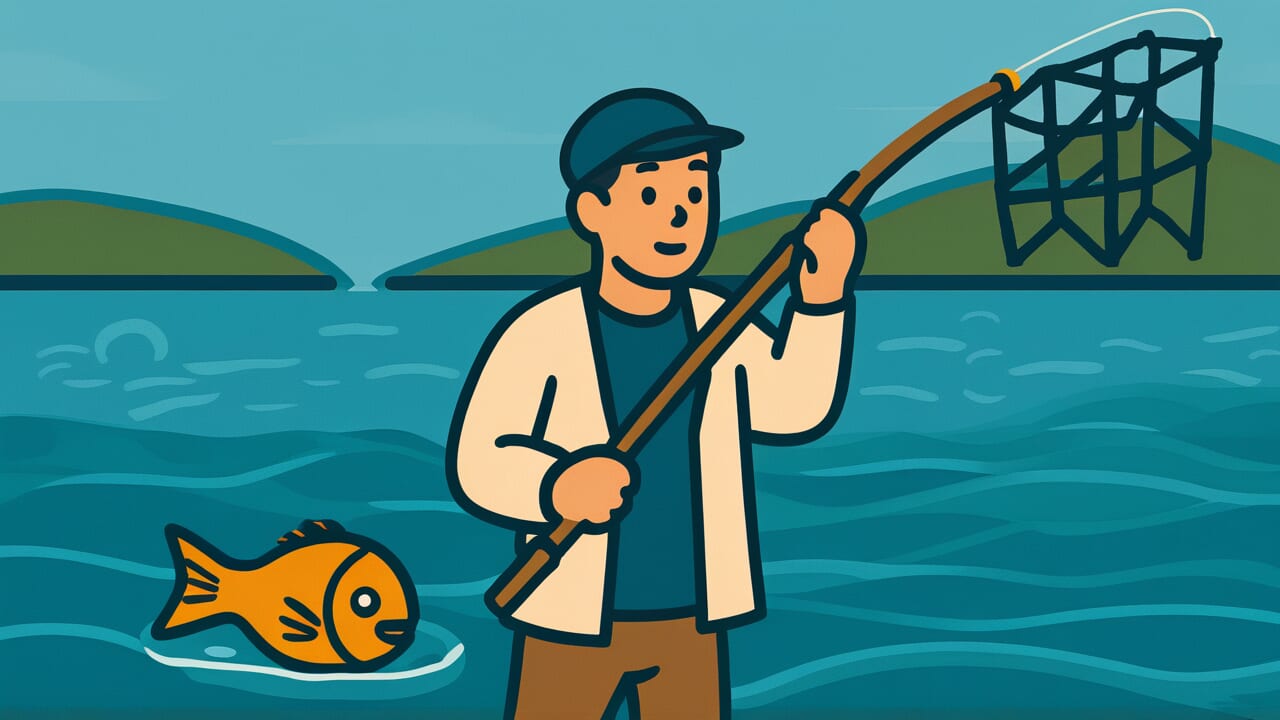How to Read “Fish but don’t pull the net”
Tsuri shite ami sezu
Meaning of “Fish but don’t pull the net”
“Fish but don’t pull the net” is a proverb that warns against taking more than necessary and avoiding needless killing.
It shows the attitude of getting only what you need through fishing, rather than catching everything at once with a net.
This proverb warns against greedy behavior that goes beyond reasonable limits.
Just because an opportunity exists doesn’t mean you should take everything. It teaches a humble attitude of taking only what you need with moderation.
Today, people still use it to criticize overharvesting of resources or excessive pursuit of profit.
This expression works well because it uses a clear contrast between two fishing methods.
It shows the difference between moderate behavior and greedy behavior in a way everyone can understand.
Through a familiar fishing scene, it conveys deep teachings about sustainability and respect for nature.
Origin and Etymology
The exact origin of this proverb in historical texts hasn’t been identified.
However, we can make interesting observations from how the phrase is constructed.
The expression contrasts two fishing methods: “tsuri” (fishing) and “ami” (net).
Fishing catches fish one at a time, allowing you to get only what you need.
Nets, on the other hand, catch large quantities of fish all at once.
This proverb means “fish but don’t use nets,” showing a moderate attitude of not taking more than necessary.
Since ancient times, Japanese culture has emphasized living in harmony with nature.
Buddhist teachings against killing and Shinto reverence for nature’s blessings deeply influenced people’s daily lives.
Fishermen also had practical wisdom: if you catch too much, fish populations decline, and eventually your livelihood disappears.
This proverb likely emerged from the combination of Japanese views on nature and practical life wisdom.
Rather than depleting resources by chasing immediate profit, it reflects our ancestors’ deep insight about receiving nature’s blessings sustainably.
Usage Examples
- A fishing cooperative member said that the spirit of “fish but don’t pull the net” is essential for protecting ocean resources
- In business too, “fish but don’t pull the net” means not chasing only immediate profits, which leads to long-term success
Universal Wisdom
The proverb “fish but don’t pull the net” contains deep insight about how humans should face their desires.
When people see abundant resources before them, they feel the impulse to “grab everything while I can.”
This is a natural emotion rooted in survival instinct.
However, our ancestors learned from experience that acting on this impulse depletes resources and eventually causes hardship for themselves.
This proverb has been passed down through generations because humans have always struggled to balance “now” and “the future.”
Immediate profit is attractive, while the future feels uncertain.
That’s why many people succumb to the temptation of “let’s take everything we can get now.”
Yet humans also possess the wisdom to see ahead.
By exercising moderation, we can maintain a long-term perspective where not just ourselves but future generations can also receive blessings.
This proverb beautifully expresses the conflict humanity has always faced between short-term desire and long-term sustainability.
It conveys timeless wisdom: true abundance isn’t “getting everything,” but “taking what you need and leaving the rest for the future.”
When AI Hears This
Sticking to just one method like fishing actually shares the same structure as a failure pattern in machine learning called “premature convergence.”
When AI learns a new task, if it immediately jumps on the first “reasonably good method” it finds, it loses the chance to discover better methods forever.
Imagine ten slot machines lined up, each with different winning probabilities.
Just because the third machine paid out in the first few tries doesn’t mean you should keep using only that one.
You might never realize that the seventh machine actually has overwhelmingly better odds. This is the trap of insufficient exploration.
In machine learning research, theories have developed to mathematically optimize the ratio between “exploration” (trying new options) and “exploitation” (using the currently known best strategy).
What’s interesting is that exploration becomes even more valuable in changing environments.
The best fishing spot today might not be the best tomorrow.
Different techniques like nets, different locations, new bait—systems that don’t regularly test these options become fragile when environments change.
Google and Amazon’s recommendation algorithms also incorporate mechanisms that intentionally present new options, not just users’ known preferences.
Fixating on one approach may seem efficient in the short term, but you’re actually paying the hidden cost of lost information-gathering opportunities.
Lessons for Today
What “fish but don’t pull the net” teaches modern people is that true abundance isn’t about “how much you have” but “how you have it.”
We live in a consumer society constantly surrounded by messages saying “more, more.”
When there’s a sale, we buy more than we need. When information overflows, we try to grab it all.
When opportunities appear, we try to seize everything.
But this proverb makes us pause and asks: “Do you really need it all?”
To apply this wisdom in modern life, start by “knowing what’s enough.”
In work, relationships, and consumption, adopt an attitude of cherishing only what you need.
When you’re freed from the anxiety of trying to get everything, you see the value of what you already have more deeply.
And when you exercise moderation, you’re actually giving a gift to the future.
Leaving resources, leaving opportunities, leaving possibilities—this is kindness toward the next generation and your future self.
A life without greed is never a loss.
It’s the most certain path to sustainable happiness.



Comments